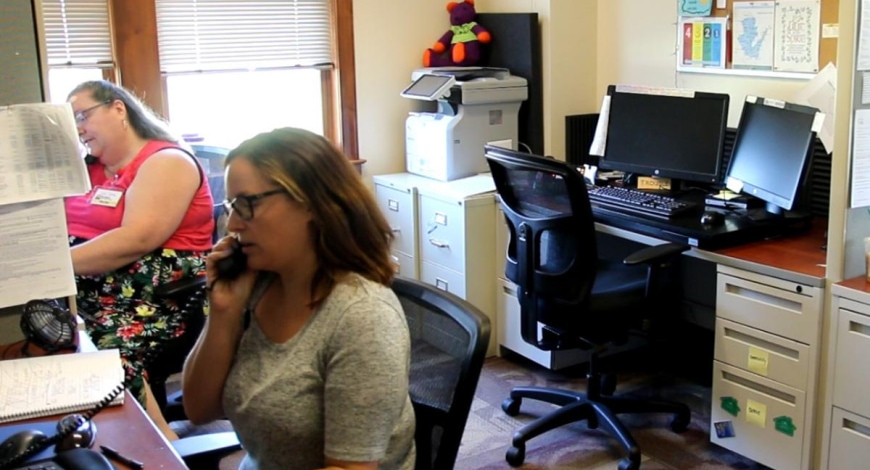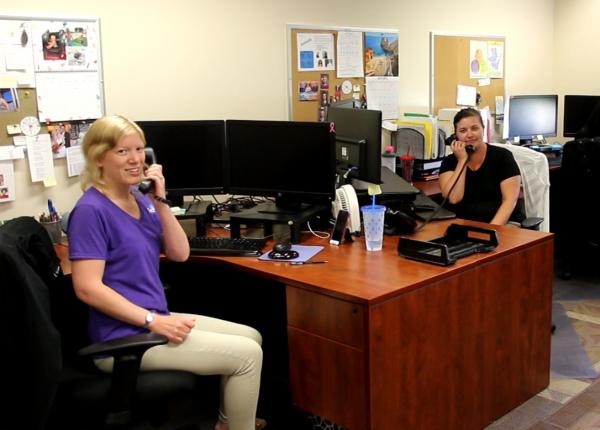Nursing Behind the Scenes at Unity

In the world of healthcare, there are seemingly endless options in terms of career opportunities and types of nursing to explore. One area of nursing I had rarely considered for myself was that of a triage nurse. I had the misconception that a “desk job” would be boring, that I wouldn’t feel like a “real nurse” if I were no longer working face-to-face with patients and families. In all honesty, I knew very little about what a triage nurse did, but after nearly a decade of hospice nursing at the bedside, I had found myself at a bit of a crossroads and decided I was due for a change in my career. I was met with an opportunity to transition to a triage nurse role at Unity; with some hesitation, I decided to pursue it. Over two years have passed since I made that decision, and I can happily say that I am frequently met with opportunities to use my nursing skills, critical thinking, compassion, and creativity and can report that I am never bored in this role.
In a general sense, triaging in healthcare involves using prioritization skills to determine which patient needs are the most urgent and which can be addressed in the near future. In hospice, there are no questions too big or too small and we do view all needs as important. Some needs however, such as pain, shortness of breath, and injuries are critical to address and respond to as quickly as possible. As a result, critical thinking, multitasking, and time management are key skills in the fast-paced environment of our triage department.
At Unity, we have triage nurses available to field phone calls, emails, and messages around the clock from the 13-counties we serve in northeast Wisconsin. We rely on our reception teams and answering service to route these messages quickly and accurately for our review. Patients, families, caregivers, and nursing facility staff can call day or night to report symptoms, ask questions, and voice concerns. Often, we receive calls from people who are scared, panicked, sad, grieving, overwhelmed or unsure of themselves in urgent and uncomfortable situations. Our job is to try to calmly bridge the gap between suffering and comfort; we aim to be able to provide teaching, emotional support, and reassurance over the phone in order to promote comfort and safe care in place.
Sometimes a symptom management need or care issue cannot be solved or reduced completely over the phone, so our job is to then determine how soon a nurse or other Unity discipline (such as a CNA, social worker, or chaplain) needs to be dispatched for a face-to-face visit. We document the details and follow up needs gathered during the call and guide the caller on how to best reduce discomfort until our staff can arrive. The triage team then relies on the assistance of our scheduling coordinators to swiftly assign and coordinate these visits with our field staff.

Triaging in healthcare involves using prioritization skills to determine which patient needs are the most urgent and which can be addressed in the near future.
Although triage nursing happens at a desk behind a computer and a phone, there is no shortage of critical and creative thinking. One of the biggest transitions for me when I took this position was going from having the patient and medications and equipment right in front of me to demonstrate a task or complete an intervention myself. As a triage nurse working via phone, I cannot physically see what is present in the home and I must be able to gather information about the setting or situation and explain medication administration, symptom management, medical equipment troubleshooting, and safety interventions simply but thoroughly enough to someone who is typically not medically trained. Flexing my brain in this unique way keeps me challenged and encourages me to continue improving my communication skills.
Besides being a resource for patients and families, triage nurses at Unity also help to support the community staff in their day-to-day work. Because our team handles such a wide variety of situations and concerns, we frequently receive calls from staff looking to collaborate or receive guidance or teaching on certain processes and patient care issues. Unity staff who work in the community are often needing to multitask to meet patient needs; the triage team provides back up in assisting with certain tasks and jobs that help keep our bedside staff more present and less disrupted when they are visiting patients. Triage nurses partake in a lot of behind-the-scenes communication with doctor’s offices, clinics, supportive care teams to provide updates, relay messages, and receive new orders for medications or interventions. Our triage department also aids with logistical issues such as coordinating supplies, medical equipment, and medication needs with our various vendors and pharmacies. There is such a variety in the work that we do and there is rarely a dull day.
While it is true that a career in hospice inevitably entails difficult and sad situations, there are also many rewarding moments and perspectives gained in this unique line of work. We are so privileged to be invited into our patient’s lives at such an intimate and vulnerable time and it is an honor to be a part of that. We learn so much about appreciating and living life to the fullest from our patients and the stories that they share. In the triage department, we are often one of the first people in line to be able to help when our patients are in distress. Each call and contact we make provides us with the opportunity for someone to feel heard or supported or to become more comfortable. That in and of itself is something I am proud to be a part of; being a triage nurse at Unity is truly so much more than a boring desk job.
Contact Unity 24/7 if you have any questions or call Unity Hospice at 800-990-9249 to learn more about how we can support you.
This blog post was shared by Keri S., a Registered Nurse at Unity Hospice.
If you found this information helpful, please share it with your network and community.






